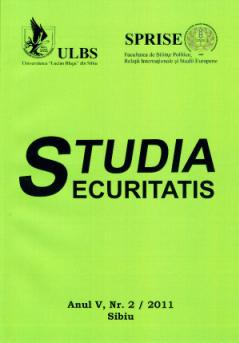DEFINIŢIA CONVENŢIONALĂ A CRIMEI DE AGRESIUNE ŞI COMPETENŢA CURŢII PENALE INTERNAŢIONALE CU PRIVIRE LA ACEASTA
CRIME OF AGGRESSION CONVENTIONAL DEFINITION AND THE COMPETENCE OF THE INTERNATIONAL CRIMINAL COURT IN THIS MATTER
Author(s): Stelian ScăunaşSubject(s): Law, Constitution, Jurisprudence
Published by: Editura Universitatii LUCIAN BLAGA din Sibiu
Keywords: public international law; international criminal Responsibility; International Criminal Court; International Crimes; aggression; crimes of aggresion
Summary/Abstract: The absence of a clear definition of aggression and the means by which it would be limited in the international behavior, especially by defining and punishing serious crimes of aggression, is one of the biggest problems that the international community is facing for more than half a century and without solving it, the ideal international law as a right of peace is virtually unattainable. We are today in the presence of a laudable attempt to define aggression and the crime of aggression closely linked to the work of States Parties to the Rome Statute of the International Criminal Court. It is a laudable attempt, because it tries to end the string of failed attempts in the interwar period and especially after the adoption of the UN Charter, which proclaims non-aggression treaty as one of the seven fundamental principles of public international law. It is about the Review Conference of the International Criminal Court Statute, which took place from May 31 to June 11, 2010, in Kampala, Uganda, the conference convened by the General Secretary of the United Nations, aimed at defining the crime of aggression, knowing the fact that this international criminal court, the first world criminal court established by a general treaty, had suspended by its jurisdiction the crime of aggression just because of the absence of a conventional definition of the crime. For a long time, the states have had a legitimate right to make war (jus ad bellum), namely to use armed force to resolve the disputes between them. The concerns for limiting the war as an instrument of national policy of the States and peaceful settlement of international disputes, although they appeared quite late in terms of rules of international law, become almost an obsession that will become more prominent after the Second World War . With the adoption of the UN Charter, the irregularly war of aggression becomes a rule with character of universality and with a value of fundamental principle of public international law. Basically, the UN Charter requires to the states the obligation to refrain in their international relations from the threat of using force or to use it against the territorial integrity or political independence of any State, or otherwise in inconsistent with the Purposes of the United Nations. Other international documents will reaffirm and develop this prohibition with value of fundamental principle. After 12 years from the adoption of the Statute of the International Criminal Court and 10 years after its entry into force, we are witnessing a strong attempt to revise the treaty, precisely in order to define the crime of aggression and thus to offer the Court the necessary jurisdiction to judge this crime.
Journal: Studia Securitatis
- Issue Year: 2011
- Issue No: 2
- Page Range: 17-29
- Page Count: 13
- Language: Romanian
- Content File-PDF

